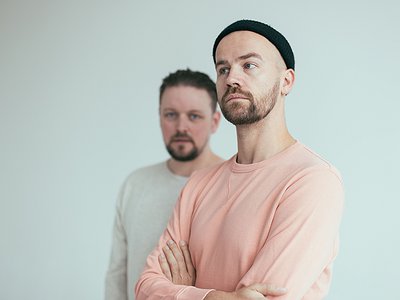Let's say you have a gig coming up tonight. What does your approach look like – from selecting the material and preparing for, opening and then building a set?
The selection takes a longer period of time. Although it's quite important for us to find new music about 2-3 days per week. After that we usually organize our USB-sticks and create playlists. During the gig itself we usually try to enter the club an hour before our show starts to check out the sound system and the crowd. We try to create a specific tension throughout the night, depending on how long our set is. A 1 1/2 h slot on a festival is completely different to one of our ALL NIIGHT sets, where we play around 10 hours on a regular basis.
Can you describe your state of mind during a DJ set, especially during one of your famous long DJ sets? What supports this ideal state of mind and what are distractions? Are there strategies to enter into this state more easily?
For our ALL NIIGHT sets the environment is very important for us. The clubs are carefully chosen. Those nights are more intense and give us a stronger feeling what DJ’ing means. Together with the crowd we experience a journey full of musical, emotional ups and downs (in a positive way).
What are some of the considerations that go into deciding which track to play next? What makes two tracks a good fit? How far do you tend to plan ahead during a set?
Because we play as a duo - so basically a constant B2B - it's quite difficult to plan the set over a longer period of time. This means it's more important that we both harmonize well and that we have a similar vision for the night. Although I have to say that our two quite different characters and with them connected the music selection make our sound special.
You've stated that you like to work in great detail on he sound aspects of your production. What's this like during one of your DJ sets? What kind of sound sculpting is possible in the live situation and how do you make use of it?
When it comes to productions, we usually love those specific sound details. But to be honest, sometimes there's no difference between a detailed track and a rough track because in most of the clubs you just don't hear those fine details. Those details are more for our own listening pleasure when we listen to music in the studio, at home, or on the road on good quality headphones.
Would you say you see DJing as improvisation? As composition in the moment? Or as something entirely different from these terms?
For us it's probably a mix of both. Sure, you have an idea about the night or some tracks you definitely want to play but often it turns out completely different. It's also very important to act impulsive and to interact quite direct with the crowd.
How do playing music at home and presenting it in the club compare and relate? What can be achieved through them, respectively, and what do you personally draw from both? What, concretely, do some of your favourite clubs, such as Berlin's Watergate, add to the experience?
When I listen to music at home it's not only electronic music. I really like German Rap or old German music like Hilegard Knef. But I often listen to electronic music in the studio or during flights before sets or simply when I go out. When we play at an amazing club like Watergate you get a totally different view on music because tracks are working in this place that are not working in any other place because the crowd at Watergate is really into music. And because Watergate is open until the late morning hours. So, you can play songs there that you wouldn't normally play at a club in a country where they have to close doors at 3am.
How would you describe the relationship between your choices and goals as a DJ and the expectations, desires and feedback of the audience? How does this relationship manifest itself during a performance and how do you concretely tap into it?
This is one of the most important tasks. We DJ, because music is our life and we want to share our enthusiasm with as many people as humanly possible. Luckily our expectations mostly match with those of the crowd on the dancefloor. It's amazing if those two energies become one.
Especially thanks to the storage facilities of digital media, DJ sets could potentially go on forever. Other than closing time, what marks the end of a DJ performance for you? What are the most satisfying conclusions to a set?
Basically that it's also us who have the opportunity to make people and even ourselves happy with our music. When we achieved that - perfect!
Art can be a purpose in its own right, but it can also directly feed back into everyday life, take on a social and political role and lead to more engagement. Can you describe your approach to art and being an artist?
It's hard to give a general statement. Sometimes art should stand for itself–perhaps even has to. At some point something happens exactly because of this. The nice thing about it is that it allows everyone to interpret it differently. Sometimes art has a direct context and it helps moving things in life.



